| Your browser is not supported. | ||
|
Please browse our site using any of the following options:
| ||
The Ultimate 4WD Checklist - All the Gear You Need to Pack!
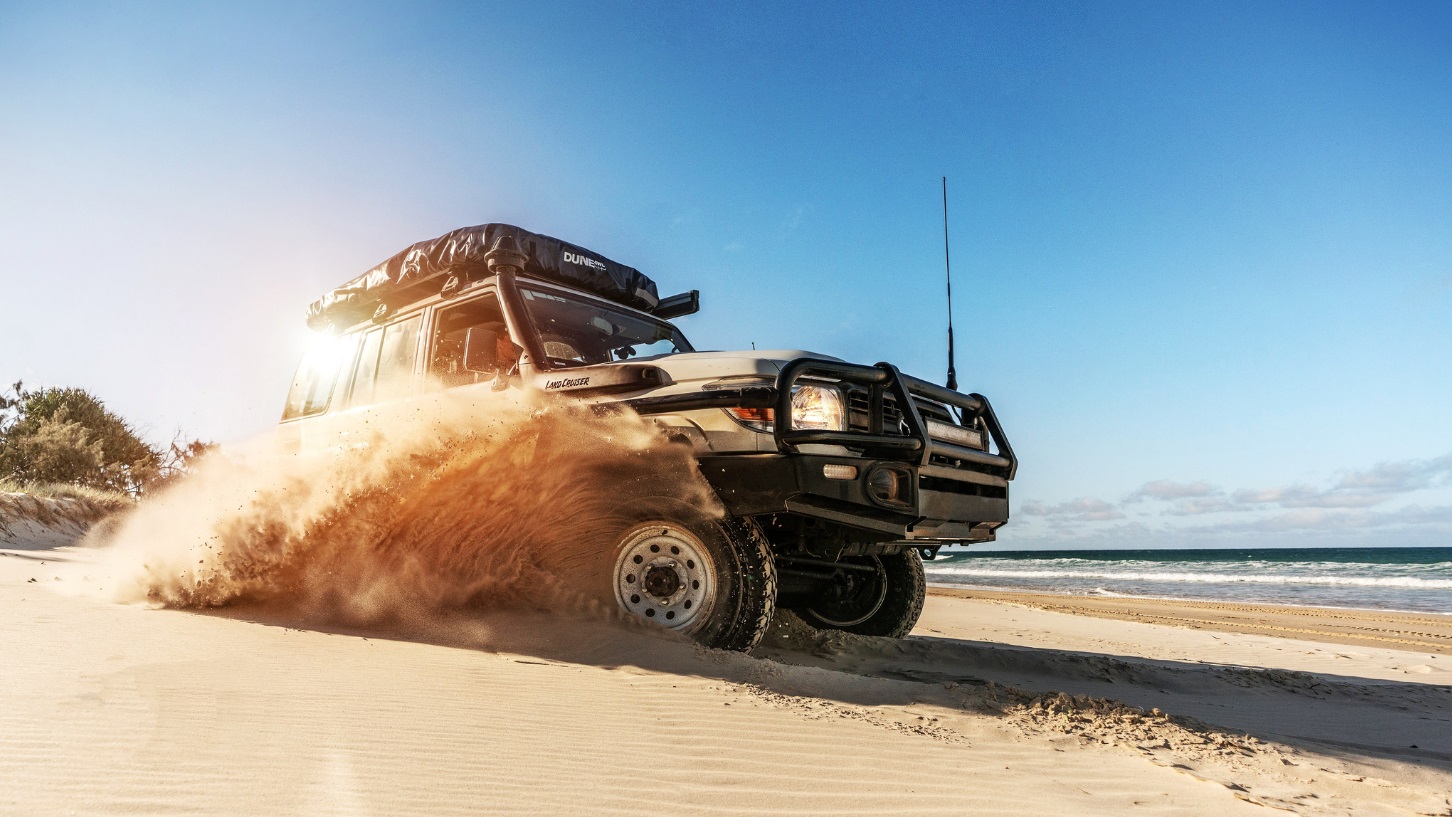
If you're new to off-roading or looking to embark on a new trip, you probably can't wait to pack your 4WD and head off to some truly remote locations. But before you roll off into the wilderness, take some time to make sure you've got everything you need for the journey. After all, this isn't like a trip to the caravan park where you can just duck down to the shops to pick up a few bits and pieces.
When you go remote, forgetting to bring the right equipment, or not learning how to use your equipment correctly, can actually land you in some trouble. Getting bogged down, encountering challenging terrain, camping in remote locations, and having no phone signal and no access to shops is common for 4WD adventures. So check off the essentials before you embark to minimise danger and maximise fun. We have put together this handy guide and downloadable 4WD camping checklist - so you can rest easy knowing you're fully equipped and ready to go.
Download 4WD Adventure Checklist
Quick Links:
- Personal Safety Items & Communication
- Communication and Navigation
- Recovery Gear
- Camping Essentials
- 4WD Accessories
- Food, Water & Personal Essentials
Personal Safety Items & Communication Checklist
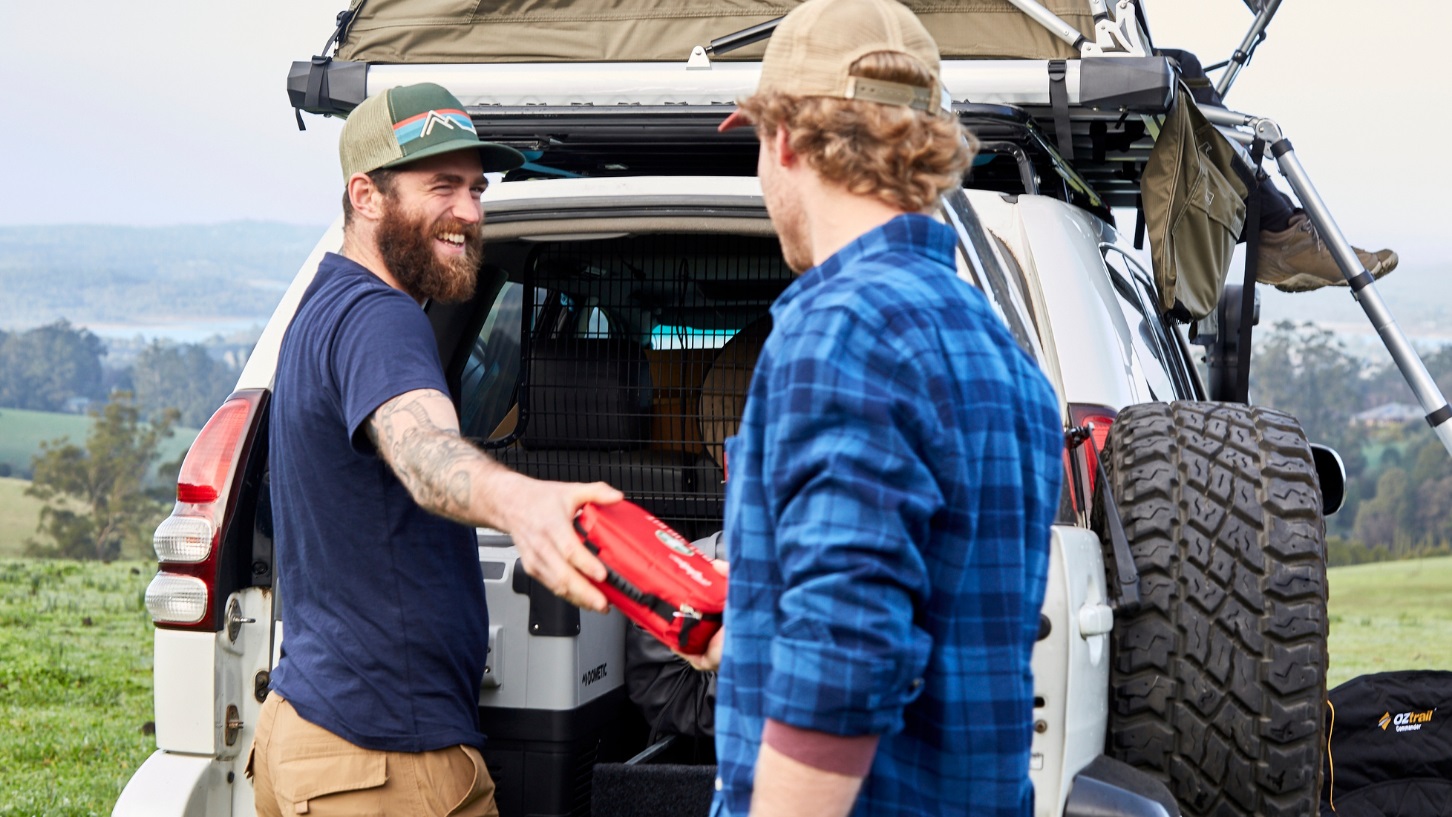
Personal safety should always come first for obvious reasons. And if you're going off-grid regularly, it's a great idea to not only carry the right first aid gear but also have an understanding of how to administer basic first aid such as CPR and applying a snake bandage. Once you've got that sorted, it's time to get yourself a first aid kit with everything you need for going off-grid. As a guide, here are a few essentials you should have with you no matter what adventure you're planning:
- First Aid Kit
- Fire extinguisher
- 2-way radio
- Torch or headlamp
- Map / GPS / Compass
- Jump Starter
While the above items are all essential for a safe 4WD trip, you should ensure that you are fully equipped with a first aid kit. See the specific first aid kit checklist below.
First aid kit:
Your first aid kit should contain the essentials which can be life-saving when it comes to an accident. Ensure you have the following:
- Adhesive bandages
- Compression bandage (or snake bite kit)
- Gauze
- Safety pins
- Irrigation syringe
- Antiseptic wipes/cream/lotion
- Ibuprofen and paracetamol
- Antihistamines
- Tweezers
- Disposable latex gloves
- Hydration tablets
- Space blanket/bivvy sack
Communication and Navigation List
It's imperative you're able to track your location and communicate that to others should you need help at any time, and to do this you need the right communication equipment and know how to use it properly.
UHF CB Radio
A UHF CB radio is absolutely essential for anyone considering going off-road. Mobile coverage can be patchy at best in remote areas and not having a UHF radio can turn a mishap like getting bogged or breaking down into a real disaster.
A UHF CB (Ultra High-Frequency Citizen Band) radio enables you to explore remote areas of Australia knowing that, should you run into trouble, you'll be able to contact anyone within a 5-8 km radius of your position.
4WD GPS
To navigate reliably, you'll want to get yourself a GPS that is made specifically for off-roading. This means having topographical mapping as well as street mapping - enabling you to see contour lines, geographical features, unsealed roads and 4WD tracks - because when there are no buildings around, knowing the lay of the land and where mountains and rivers are in relation to your position is vital. For an in-depth look at off-road GPS, check out our article on What to Look For in a 4WD GPS.
Recovery Gear Packing List
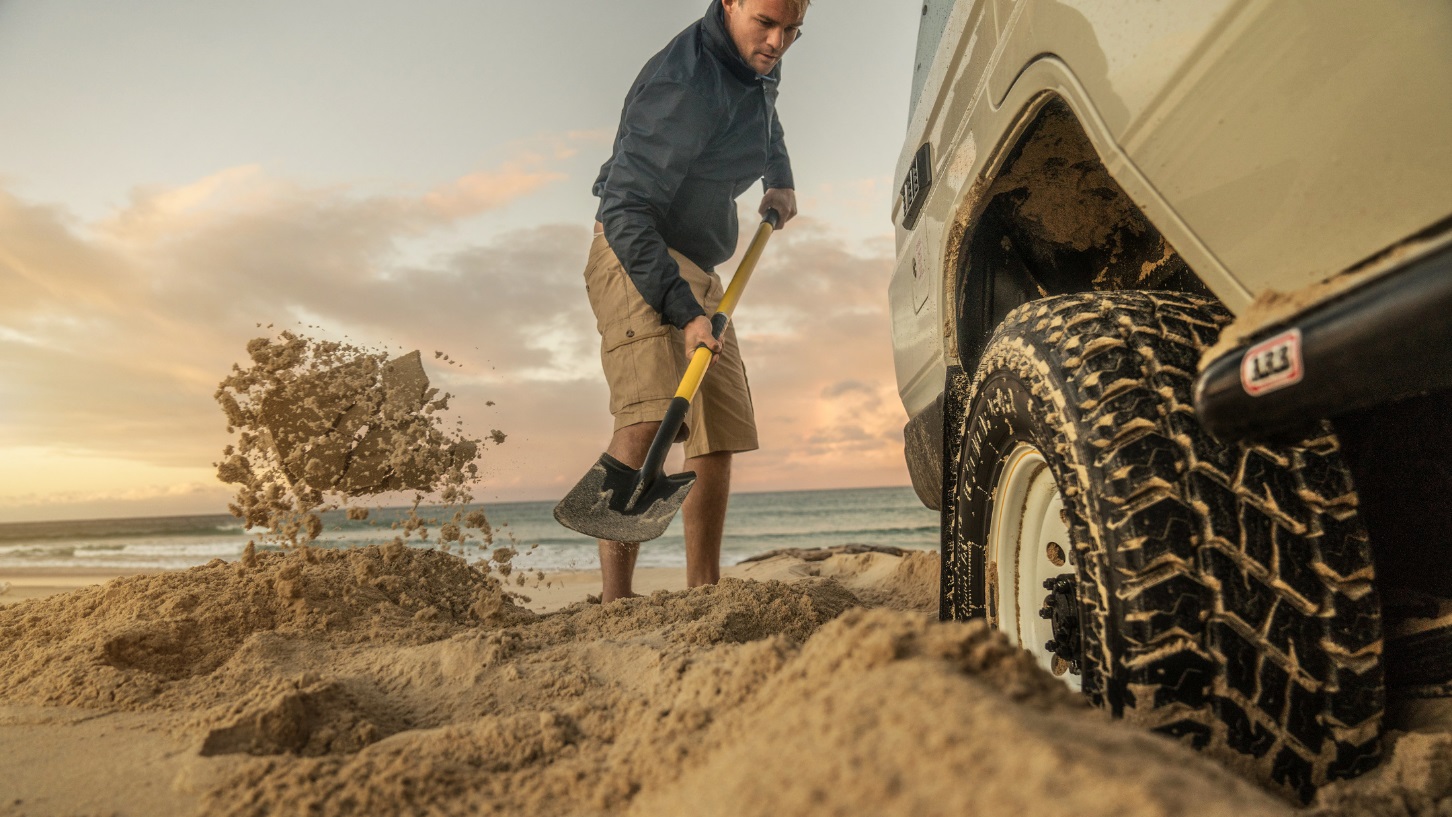
For your 4WD adventure, recovery gear can make the difference when you get in a sticky situation. Your recovery gear checklist includes:
- Recovery Boards
- Shovel
- Hi Lift Jack
- Snatch strap / Kinetic Rope
- Bow / Soft Shackles
- Winch Dampener
- Tool Kit
- Fuel Jerry Cans
Read more below about the specific purposes of each piece of recovery equipment:
Recovery Boards
Recovery boards offer a safe and simple method of recovering your vehicle from sand, mud, bog holes and snow. They're easy to carry and provide a quick way out of many situations that would have normally called for a winch.
Shovel
A bit of elbow grease and a shovel can save you a lot of time and effort in the long run. Choose a shovel with a handle long enough to reach right under your vehicle, the longer handle will also give you more leverage and make using it a whole lot easier.
High Lift Jack
A practical and versatile recovery accessory that can be used when you need to lift, winch, clamp, pull and push. They are useful in lifting a vehicle clear of obstacles that come into contact with the underbody.
Snatch Strap
A snatch strap is essentially a long strap with loops at both ends. They use kinetic energy to sling-shot a vehicle out of a bogged situation. While they can be incredibly useful when used correctly, they're also very dangerous if misused, so make sure you know what you're doing.
Basic Tools
A good set of tools should be packed just in case of an emergency breakdown. Even some basic hand tools can get you out of a tricky situation. A good starting kit should contain a complete socket wrench set, adjustable spanner, flathead and phillips screwdriver, hammer, pliers, electrical and duct tape, WD40 or equivalent, cable ties, rags, and a bottle or high lift jack.
Fuel Containers
Australia is a huge country and if you're going remote, the last thing you need is for the petrol light to come on when the nearest servo is miles away. Fuel containers like Jerry cans should be purpose-made for holding petrol, heavy duty and UV-resistant. Never store fuel in a container that is not specifically made for that purpose. Petrol and other fuels can degrade polyethylene plastics, causing leaks and contamination of the fuel itself.
Camping Essentials & Equipment List
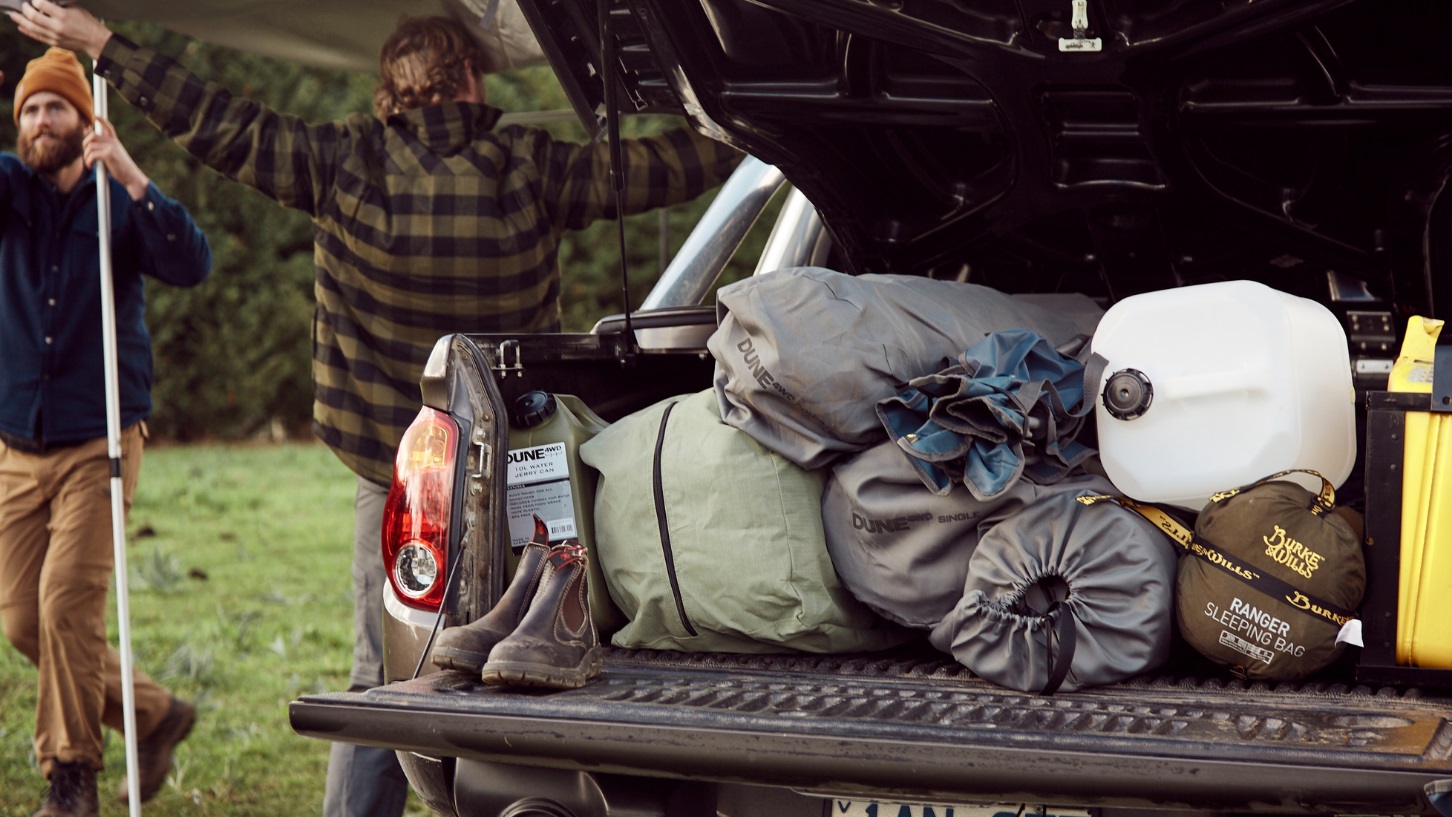
The camping equipment you choose to take with you is largely down to personal preference, but whether you're in a swag or a rooftop tent, you will want to make sure you have a comfortable sleeping setup that will keep you warm, dry and protected from the elements.
4WD Camping Gear Checklist:
- Tent or swag
- Camping stove
- Matches / fire starter / lighter
- Cooking utensils
- Food
- Water
- Power supply e.g., solar panels, generator, or power inverter
- Lantern / Torches & extra batteries
- Sleeping bag
- Bedding
- Portable Fridge/Freezer
- Camp chair
- Shower tent
- Portable toilet
- Gas Bottle
- Axe
- Knife / Multitool
Also, make sure you have a car fridge or a good quality cooler with enough ice to keep your perishables cold for the duration of your trip and enough space to store your food (and chilled beverages). For some great hacks on keeping your cooler cold for longer, take a look at our article on Fridge and Cooler Hacks.
4WD Accessories List
You can increase convenience and ensure your vehicle is set up for success with these accessories:
- Air compressor
- Tyre deflators/gauge
- Puncture repair kit
- Water jerry can
- Awning
- Rear wheel rubbish bin
- Load restraints
Air Compressor/Tyre Gauge
Not letting your tyres down on soft surfaces like sand is a great way to get yourself bogged. There are recommended pressures for a whole range of surfaces (check out our handy guide to tyre pressures) and to make sure your tyres are at the correct pressure, it's best to use a tyre gauge to deflate your tyres and an air compressor to inflate them again when you get back on the blacktop.
4WD Awning
If you haven't got one already, a 4WD awning can really take your camping setup up a couple of notches. Not only do they provide a nice spot of shade and protection from the rain but they can usually be set up and packed down in around two minutes, making them a hard option to pass up
Load Restraints
Additionally, having adequate load restraints is great for the safety and security of your gear. Whether you're using roof racks or the tray of your ute to carry your gear, it's a no-brainer (and a legal requirement) that you make sure it's tied down securely. Ratchet tie-down straps are a great way to ensure your load is secure, but there are many other options like bungee cords, tray nets and good-old-fashioned rope. Whatever load restraint you use, just make sure that your gear is not going to move around when you hit the trails.
Food, Water & Personal Essentials List
Basic essentials are a must-have for any 4WD trip, this includes:
- Water
- Food
- Sunscreen
- Insect repellent
The guidelines for remote travel are to carry double the water needed for survival. This varies between 2 and 3L of drinking water per person, per day but can be higher in extreme environments like deserts. It's also a good idea to carry your water in multiple containers or Jerry cans, this way if one gets damaged or gets contaminated, you will still have enough water to keep you out of trouble. While we can survive much longer without food, it's always a good idea to pack a little extra just in case you need it. Long-lasting foods such as canned goods, beef jerky or energy bars are great options as they won't go to waste if they don't get used on each trip.
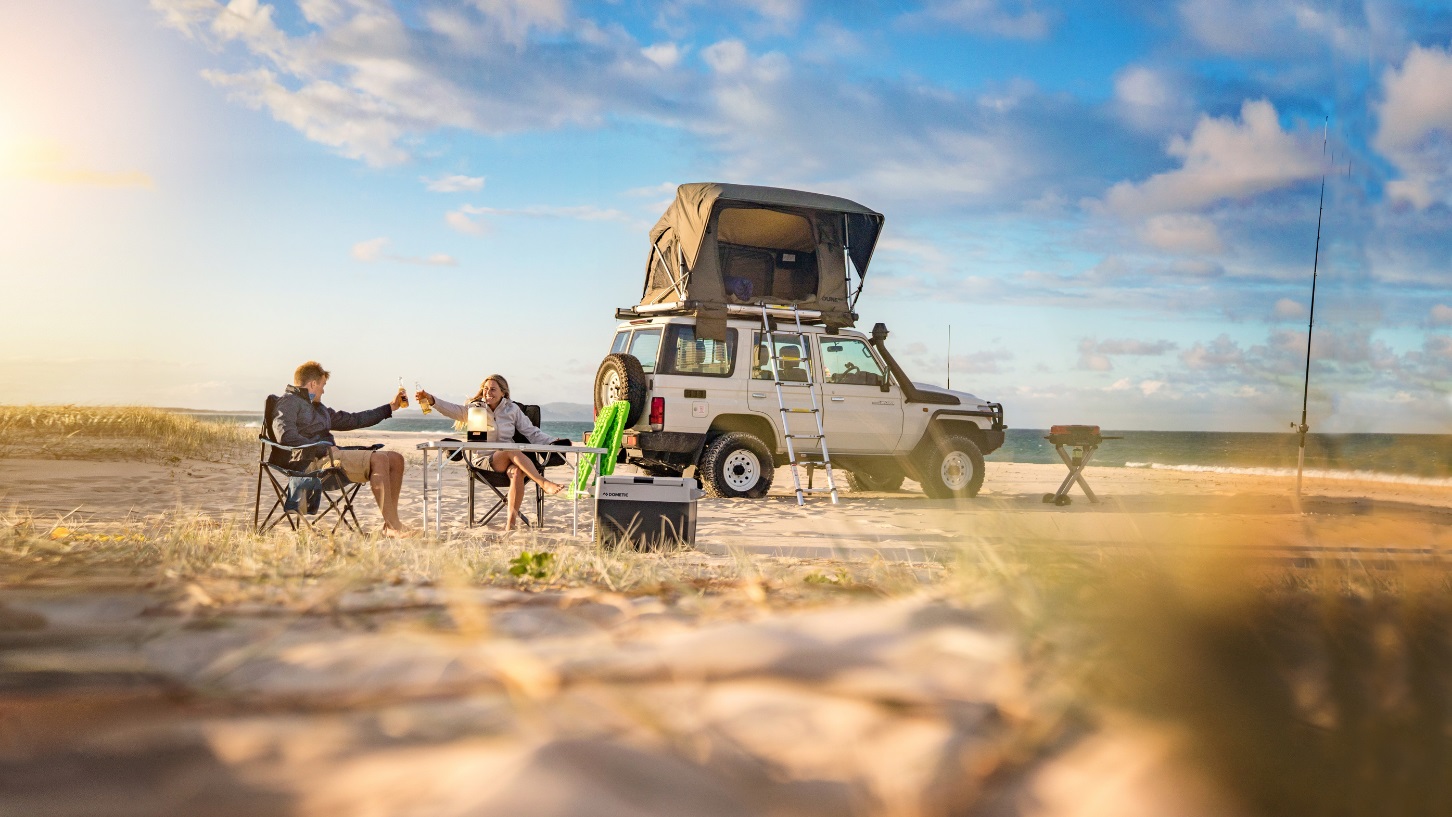
Ensure You're Fully Equipped For Your 4WD Adventure with the Ultimate Checklist at Anaconda
Off-roading is not only a heap of fun, but it also enables you to visit places that are otherwise completely inaccessible. And while there is a fair amount of gear and know-how required to get properly prepared, once you're set up with the right 4WD accessories, you won't look back. From spontaneous weekends away with swag and a campfire to taking a year or two to do the big lap, your future adventures really have no limits. Australia is a vast, exciting and beautiful place - and there's no better way to see it than out the window of your 4WD! Download the easy-to-use 4WD touring checklist today and gear up for your adventure.
Download 4WD Adventure Checklist
Stay safe on the track and elevate your journey today with great-value gear and accessories. Shop everything you need for your 4WD adventure at Anaconda and get more expert tips and advice at the Adventure Centre. You might like some of our other articles such as: